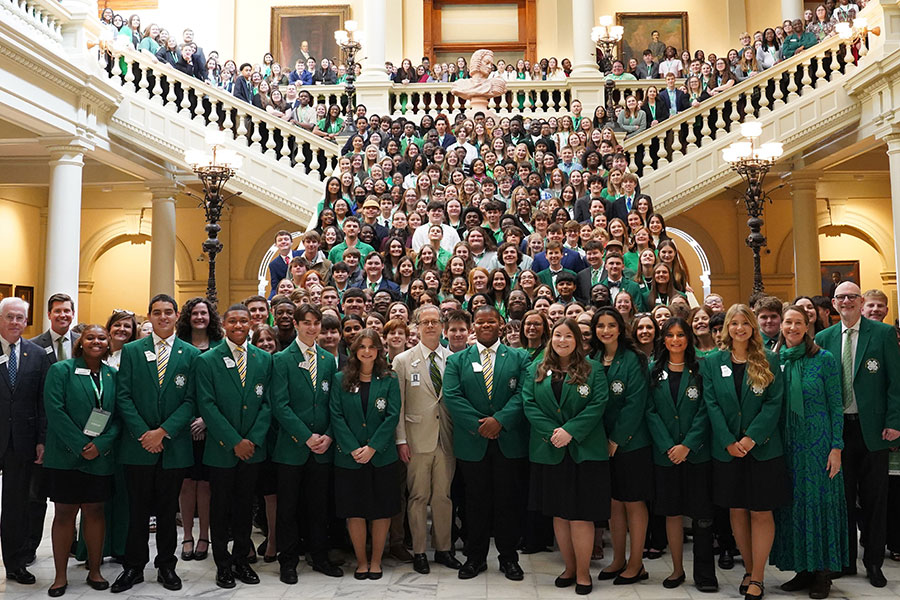It's planting season for Georgia canola growers. This year, the seeds have been planted for a better market for the emerging crop.
"We haven't had commodity canola production in Georgia for two years," said Paul Raymer, an agronomist with the University of Georgia College of Agricultural and Environmental Sciences in Griffin, Ga.
"All the canola grown in Georgia has been grown on contract," Raymer said. "But this year two crushers have shown interest in seeing commodity canola revived so they would have an oilseed commodity they could buy. They see a market here for it."
Request
the high-res image. GRIFFIN DAILY NEWS/BOB FREITAG |
| NEW MARKETS will allow Georgia canola farmers to sell their crop in-state. Crushing facilities in Vienna and Dawson, Ga. offer close to world prices for Georgia-grown canola. University of Georgia agronomist Paul Raymer, pictured above, said he and other UGA scientists are working to learn more about the crop to help Georgia famers who want to include this oilseed in their crop rotation. |
Farmers grow grain crops mostly as openly marketed commodities. Companies with special needs, though, sometimes offer contracts for farmers to grow a certain amount of a specific type of grain.
When Calgene, the major contractor for canola in the state, offered no new contracts to Georgia farmers, the crop's future here looked bleak.
Most canola is grown in Canada. The crop is struggling to catch on in the Southeast, where it is grown mainly in the coastal plain from Alabama to South Carolina.
"Previously, we had a buyer for the commodity canola crop," Raymer said. "But in most years, the price offered was below the world price."
Harvested canola is delivered to a processing plant, where the oil is extracted from the seed in a crushing process. The result is two products, oil and meal. The meal is used in livestock rations.
One of the new canola crushers in the state is Mid- Georgia Processing in Vienna, Ga. "They were built about three years ago as a cotton crushing plant," Raymer said. "In recent months, they've seen the need to diversify and crush other products like canola."
The other new crusher is Cargill Peanut in Dawson, Ga. "They've been doing some limited crushing of canola for the past six years," Raymer said. "They're planning to expand that now."
The two firms' commitment to canola pumps fresh hope into the crop, which Raymer believes has great potential as a money-maker for Georgia farmers. "Having these two new crushers gives us a viable market," he said.
"In the past, we've had to rely on a market based largely on the expectation that the crop would be shipped to Canada for crushing," he said. "Prices were discounted to compensate for that low volume and the need to ship it long distance for crushing."
The crushers are finding Southeastern markets for the oil and meal.
"We import large amounts of oil and meal in the Southeast, the meal primarily for use in the poultry industry. They will try to market the product here," Raymer said.
It's a modest beginning that could make the future as bright as the crop's dramatic fields of yellow flowers.
"In the long term, it means we finally have markets we can start to grow an industry around," Raymer said. "If you don't have someone to buy it (at a good price), it's hard to develop an industry. This puts us on equal footing with other canola-producing regions of the world."
Raymer and other UGA scientists have been developing canola varieties and growing techniques to make the crop work in Georgia.
"We've had a strong research and extension effort for the past eight years," he said. "We just released the first variety from our breeding program this year. It's available to growers on a very limited basis now."
UGA scientists at the Griffin and Tifton, Ga., experiment stations have been developing a Southeastern production system for canola.
"We've had a strong collaborative effort with industry to develop this new crop for the Southeast," Raymer said.
"We've conducted research to determine the proper planting dates, planting and harvest methods and fertility requirements," he said. "And we've developed ways to control insects and diseases."






